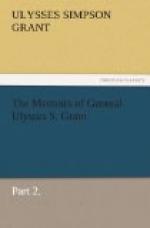By three in the afternoon of the 14th Flag-officer Foote was ready, and advanced upon the water batteries with his entire fleet. After coming in range of the batteries of the enemy the advance was slow, but a constant fire was delivered from every gun that could be brought to bear upon the fort. I occupied a position on shore from which I could see the advancing navy. The leading boat got within a very short distance of the water battery, not further off I think than two hundred yards, and I soon saw one and then another of them dropping down the river, visibly disabled. Then the whole fleet followed and the engagement closed for the day. The gunboat which Flag-officer Foote was on, besides having been hit about sixty times, several of the shots passing through near the waterline, had a shot enter the pilot-house which killed the pilot, carried away the wheel and wounded the flag-officer himself. The tiller-ropes of another vessel were carried away and she, too, dropped helplessly back. Two others had their pilot-houses so injured that they scarcely formed a protection to the men at the wheel.
The enemy had evidently been much demoralized by the assault, but they were jubilant when they saw the disabled vessels dropping down the river entirely out of the control of the men on board. Of course I only witnessed the falling back of our gunboats and felt sad enough at the time over the repulse. Subsequent reports, now published, show that the enemy telegraphed a great victory to Richmond. The sun went down on the night of the 14th of February, 1862, leaving the army confronting Fort Donelson anything but comforted over the prospects. The weather had turned intensely cold; the men were without tents and could not keep up fires where most of them had to stay, and, as previously stated, many had thrown away their overcoats and blankets. Two of the strongest of our gunboats had been disabled, presumably beyond the possibility of rendering any present assistance. I retired this night not knowing but that I would have to intrench my position, and bring up tents for the men or build huts under the cover of the hills.
On the morning of the 15th, before it was yet broad day, a messenger from Flag-officer Foote handed me a note, expressing a desire to see me on the flag-ship and saying that he had been injured the day before so much that he could not come himself to me. I at once made my preparations for starting. I directed my adjutant-general to notify each of the division commanders of my absence and instruct them to do nothing to bring on an engagement until they received further orders, but to hold their positions. From the heavy rains that had fallen for days and weeks preceding and from the constant use of the roads between the troops and the landing four to seven miles below, these roads had become cut up so as to be hardly passable. The intense cold of the night of the 14th-15th had frozen the ground solid. This made travel on horseback even slower than through the mud; but I went as fast as the roads would allow.




